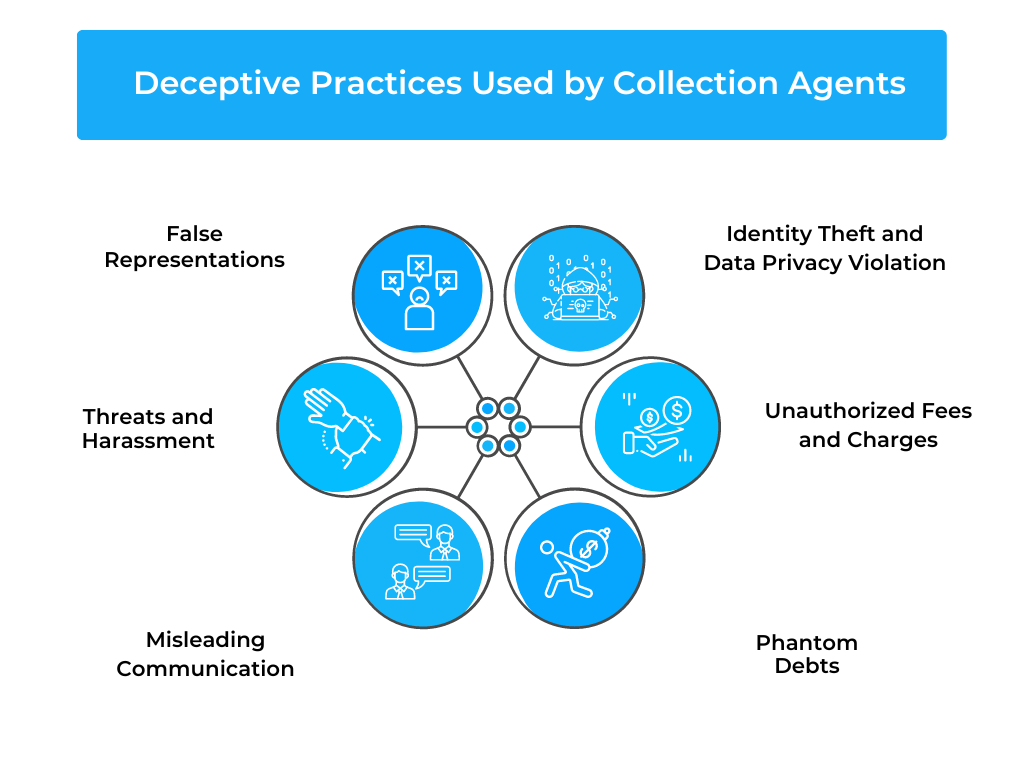Beyond Debt Recovery: Unmasking The Fraudulent Tactics Of Collection Agents

Introduction: The Dark Side of Debt Collection
Debt collection is a necessary process for recovering unpaid debts, ensuring financial stability for businesses and individuals. However, the industry is not without its dark side. Behind the scenes, some collection agents employ fraudulent tactics that go beyond ethical boundaries, causing distress, harm, and financial hardship to consumers. This article aims to shed light on these fraudulent practices, uncovering the hidden strategies employed by unscrupulous collection agents. By understanding these tactics, consumers can better protect themselves and advocate for their rights when dealing with debt recovery agencies.
Understanding Debt Recovery and Collection Agencies
Debt recovery is a crucial process for lenders and creditors to regain funds owed to them. In many cases, these entities rely on collection agencies to facilitate the debt recovery process on their behalf. Collection agencies are specialized firms or departments that specialize in pursuing unpaid debts and collecting payments from debtors.
These agencies operate within the legal framework established by relevant laws and regulations, such as the Fair Debt Collection Practices Act (FDCPA) in the United States. Their primary objective is to recover outstanding debts through various means, including contacting debtors, negotiating payment plans, and, in extreme cases, taking legal action.
Collection agencies typically operate on a commission or contingency basis, where they receive a percentage of the amount they successfully recover. This arrangement incentivizes them to employ effective debt recovery strategies, but it can also create an environment where fraudulent tactics are used to maximize profits at the expense of consumer rights.
Unveiling Fraudulent Tactics: Deceptive Practices Used by Collection Agents

While many collection agents operate within legal boundaries, there are instances where fraudulent tactics are employed to intimidate, mislead, or exploit debtors. These deceptive practices violate consumer rights and perpetuate an atmosphere of fear and coercion. By exposing these tactics, we can empower individuals to recognize and combat fraudulent behavior. Here are some common deceptive practices used by unscrupulous collection agents:
- False Representations: Collection agents may misrepresent themselves as law enforcement officials, attorneys, or government representatives to intimidate debtors. Such misrepresentation is illegal and aims to exert undue pressure on individuals.
- Threats and Harassment: Fraudulent collection agents resort to threats of legal action, arrest, or even physical harm to coerce debtors into immediate payment. Harassment through incessant calls, abusive language, or excessive communication is also a common tactic.
- Misleading Communication: Agents may use deceptive language or false information to mislead debtors about their rights, the consequences of non-payment, or the amount owed. They may manipulate facts to create a sense of urgency or induce impulsive actions.
- Phantom Debts: Some collection agents attempt to collect debts that either don’t exist or have already been paid off. These phantom debts are a ploy to extract payments from unsuspecting individuals who may be unaware of their rights or debt history.
- Unauthorized Fees and Charges: Fraudulent collection agents may add unauthorized fees, interest, or charges to the original debt amount, inflating the overall payment demanded from the debtor. These additional charges are often baseless and aimed at maximizing profits.
- Identity Theft and Data Privacy Violations: In some cases, dishonest collection agents may engage in identity theft or unauthorized sharing of personal information, jeopardizing the privacy and security of debtors.
Harassment and Intimidation: Psychological Techniques Deployed by Collection Agents
In their quest to recover debts, unscrupulous collection agents often resort to harassment and intimidation tactics that exploit psychological vulnerabilities. These techniques are designed to create fear, stress, and a sense of powerlessness in debtors, coercing them into immediate payment. Understanding these psychological techniques can help individuals recognize and effectively respond to harassment and intimidation. Here are some common strategies employed by fraudulent collection agents:
- Aggressive and Threatening Language: Collection agents may use aggressive and demeaning language, resorting to insults, derogatory remarks, or verbal abuse to instill fear and shame in debtors. This aggressive approach aims to break down resistance and force compliance.
- Constant Communication: Fraudulent agents may engage in relentless and excessive communication, bombarding debtors with frequent phone calls, emails, or letters. This constant contact can create a sense of being monitored or hounded, leading to heightened stress and anxiety.
- Public Disclosure: Some collection agents threaten to publicly disclose a debtor’s financial situation, often by discussing the debt with family members, friends, or employers. This tactic aims to embarrass and humiliate debtors, pressuring them to repay the debt out of fear of reputational damage.
- Time Pressure and Urgency: Fraudulent collection agents often create a false sense of urgency by imposing tight deadlines or immediate payment demands. They may exaggerate consequences, such as imminent legal action or negative credit reporting, to pressure debtors into making impulsive decisions.
- Manipulation and Guilt: Collection agents may try to manipulate debtors emotionally by using guilt-inducing statements or emphasizing the impact of non-payment on others, such as their families or dependents. This psychological manipulation aims to exploit the debtor’s sense of responsibility and moral obligation.
- Isolation and Isolation: Fraudulent agents may attempt to isolate debtors from seeking assistance or advice from professionals, friends, or family members. By limiting access to external support, they increase the debtor’s dependence on their guidance, making it easier to manipulate and control the situation.
Illegal and Unethical Behavior: Violations of Consumer Rights by Collection Agencies
While debt collection agencies have the legitimate purpose of recovering unpaid debts, some engage in illegal and unethical behavior that infringes upon consumer rights. These violations not only undermine the integrity of the debt recovery process but also cause significant harm and distress to individuals. It is crucial to shed light on these violations to empower consumers to recognize their rights and take appropriate action. Here are some common illegal and unethical behaviors perpetrated by collection agencies:
- Violation of Fair Debt Collection Practices Act (FDCPA): The FDCPA sets strict guidelines for debt collection, prohibiting practices such as harassment, false representations, unfair practices, and unauthorized disclosure of debt information. Collection agencies that engage in any of these prohibited activities violate consumer rights and may be subject to legal action.
- Third-Party Disclosure: Collection agencies are prohibited from disclosing a debtor’s personal debt information to third parties, including friends, family members, employers, or coworkers. Such unauthorized disclosure not only violates privacy rights but can also lead to reputational harm and emotional distress.
- Unauthorized Bank Account Access: Some unethical collection agencies attempt to gain unauthorized access to debtors’ bank accounts. This illegal practice, known as “bank account garnishment,” involves withdrawing funds from the debtor’s account without proper legal authorization.
- Harassment and Abuse: Collection agencies that engage in persistent, threatening, or abusive behavior, such as using profane language, making incessant calls, or employing intimidation tactics, violate consumer rights. Harassment and abuse not only cause emotional distress but are also strictly prohibited by law.
- Misrepresentation and Deceptive Practices: Fraudulent collection agencies may engage in deceptive practices, such as misrepresenting the amount owed, falsely claiming legal authority, or providing misleading information about the consequences of non-payment. These actions violate consumer protection laws and undermine the trust and transparency required in debt recovery.
- Unauthorized Legal Action: Some collection agencies may initiate legal proceedings without proper legal authority or without providing proper notification to the debtor. Unauthorized legal action not only violates consumer rights but can also lead to unnecessary legal expenses and unjust outcomes.
FAQ
1. What are some common illegal practices by collection agencies?
Some common illegal practices by collection agencies include harassment, threats, abusive language, unauthorized disclosure of debt information, misrepresentation of debt amounts, unauthorized bank account access, and initiating legal action without proper authority.
2. What are fraudulent tactics used by unscrupulous collection
Fraudulent tactics used by unscrupulous collection agents include false representations, threats and harassment, misleading communication, phantom debts, unauthorized fees and charges, and identity theft/data privacy violations.
3. How can collection agents mislead debtors through communication?
Collection agents can mislead debtors through communication by using deceptive language, providing false information about their rights or the consequences of non-payment, and manipulating facts to create a sense of urgency or induce impulsive actions. They may also engage in misleading tactics such as misrepresenting the amount owed or falsely claiming legal authority. These practices aim to confuse and intimidate debtors, making them more susceptible to the collection agent’s demands.
Conclusion: Promoting Transparency and Fairness in Debt Recovery
The fraudulent tactics employed by some collection agents go beyond ethical boundaries and violate consumer rights. To combat these practices, it is crucial to promote transparency and fairness in debt recovery. Tools like Legodesk can deeply help in streamlining debt collection activities. Consumers must educate themselves about their rights, familiarize themselves with relevant laws and regulations, and be vigilant in identifying and reporting fraudulent behavior. Regulators and policymakers also play a vital role in enforcing stricter guidelines and holding unscrupulous collection agencies accountable. By advocating for transparency, fairness, and consumer protection, we can ensure a more equitable and respectful debt recovery process that respects the rights and dignity of individuals.
